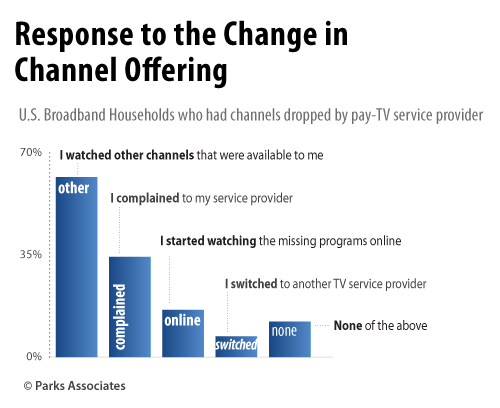New research from Parks Associates examines carriage disputes between pay-TV providers and content owners and impact on churn and online viewing
Parks Associates today reported carriage disputes can have a substantial impact on pay-TV subscribership, as 7% of pay-TV subscribers who lose a channel, roughly 2% of all subscribers, will switch providers when they drop a channel.
The new research Carriage Disputes: The Subscriber Perspective, based on multiple nationwide surveys of over 2,000 U.S. broadband households, examines the impact of carriage disputes, which have prompted pay-TV providers like DirecTV, Dish Network, and Time Warner to drop channels such as AMC, Comedy Central, Nickelodeon, and MTV as part of ongoing fee and licensing struggles between service and content providers.
"Carriage disputes are becoming more common as content costs consume bigger percentages of APRU," said John Barrett, director, research, Parks Associates. "While dropped channels do cause churn, 16% of those affected watched missing programs online, suggesting that the availability of episodes online does dampen the severity of channel loss for subscribers."

In 2012, Dish Network dropped AMC Network channels in a dispute over licensing fees, blacking out shows including Mad Men and The Walking Dead. A carriage fee dispute between DirecTV and Viacom prompted the latter to remove content, including popular shows The Daily Show and The Colbert Report, from its online portal.
Parks Associates research found at least 34% of pay-TV subscribers have lost a channel and most of them received no compensation for the loss. While 7% of them switched as a result of the loss, 36% who have lost a channel are willing to pay additional costs to regain them.
"Online viewing compensates for some lost content, but specific segments, notably high-income households with children, are the most likely to switch when losing a channel," Barrett said. "Given that many viewers are willing to pay more not to lose the content, service providers could renegotiate with content owners in order to reshuffle their offerings, moving high-priced channels to higher tiers and giving consumers the choice to pay for the content."
Carriage Disputes: The Subscriber Perspective examines the impact of dropped channels on subscriber satisfaction and retention and current consumer strategies to compensate for lost content. It also analyses the current state of the pay-TV services market and consumer interest in new service-provider technologies and offerings.
Visit http://www.parksassociates.com or contact sales@parksassociates.com, 972-490-1113 for information.
{block identifier='parks-associates-boiler'}

